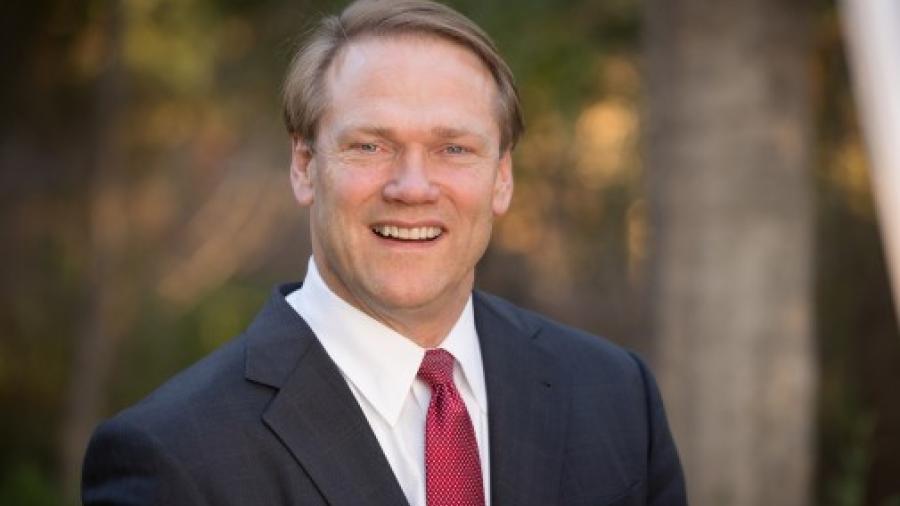Westmont Magazine Balancing Active Engagement with Prayer and Contemplation

By President Gayle D. Beebe, Ph.D.
I consider Gregory the Great (540-604) an intellectual and spiritual friend who helped me understand how to be a highly active person and also contemplative. During college, I became increasingly frustrated with my inability to abide by the spiritual disciplines. Richard Foster pastored the local Friends church and taught in the religion department at George Fox, where I attended. He made a profound impact on me and was the first person to introduce me to an ordered understanding of the Christian life. He mapped out ways we can make progress in our life with God, and I was drawn to him.
Richard wrote “Celebration of Discipline” while I studied under him. The book celebrates all the disciplines of the Christian life and reintroduced much of this great literature to Protestants. I remember Richard recommending fasting to me. “Try a three-day fast and then a 10-day fast,” he said. So I attempted a three-day fast, and after 30 hours experienced a blood-sugar episode that allowed my doctor to write a note, “Gayle should never fast again.” When I hear a sermon on fasting, I show my note to God, and He gives me a medical release.
Richard also suggested I meditate for 24 hours. That worked for about two hours and then the old cartoon of Lucy and Charlie Brown popped into my mind. Charlie Brown said, “The teacher made us sit quietly for five minutes today,” and Lucy replied, “She did the same thing to us.” Charlie Brown asked, “Well, how did it go?” Lucy said, “It nearly killed me!” That’s how I felt.
Then I read Gregory the Great. While I feel drawn to prayer, I also feel drawn to a life of active engagement—and I believe I need to pursue what God has wired me to do. Gregory the Great loved being a monk and devoting his life to reflection. But he also felt drawn to the life of the church. As he rose in rank, he longed for an easier life. But he recognized what God had called him to do and embraced it, engaging that life responsibly and reflecting on it in prayer. What a great example: engage with responsibility and reflect in prayer.
Through these twin engagements—service and reflection—we can cultivate a life of prayer that doesn’t remove us from our responsibilities but gives us the capacity to engage them with the energy and insight God intended.
Jesus told the story of the Good Samaritan to illustrate how to love our neighbor: respond to obvious need and extend acts of mercy. Immediately after the parable, he reminded Martha that the Christian life involves more than service. We also have to know God, and Mary’s inclination to learn at the feet of Jesus is an equal if not a higher calling than a life of service.
I see three key words or phrases in the account of Mary and Martha. The first, in verse 38, is “receive,” a derivative of the Greek word “hospitality,” which means “love of a stranger.” I believe Christians must have the capacity to love strangers and welcome and accommodate them.
The second word, “distracted,” comes in verse 40. The Greek term connotes, “to lose your sense of balance,” which can happen when we lose concentration. We must learn how to attend to God and to the things He puts in front of us, the things that have highest priority. We need to recognize what takes us off course and discover how to stay on track.
The third phrase is “worried and upset” in verse 41 and means to be pulled in different directions, to try to do too much and overcompensate. Martha believed the priority was serving the meal, but Mary grasped a different reality. We overcompensate when we see something that needs to be done but miss the grander thing in front of us.
During our times of reflection, God gives us deeper insights into how we can best engage life. Gregory the Great learned to balance a life of action and contemplation, service to others and prayer to God. His 14 years as pope marked a great period of advance for the church. God had prepared Gregory for a life of service and responsibility only he could perform, and he believed that our spiritual life should re-engage us in an active life of service. Action gives rise to contemplation. Contemplation makes our action more effective.
Life is lived in a rhythm. When is it time to serve? When is it time to pray? When is it time to act? When is it time to study? How can we focus more deliberately on what God wants us to do? As we grow in our life with God, we learn this rhythm as we balance active engagement with the world with prayer and reflection.